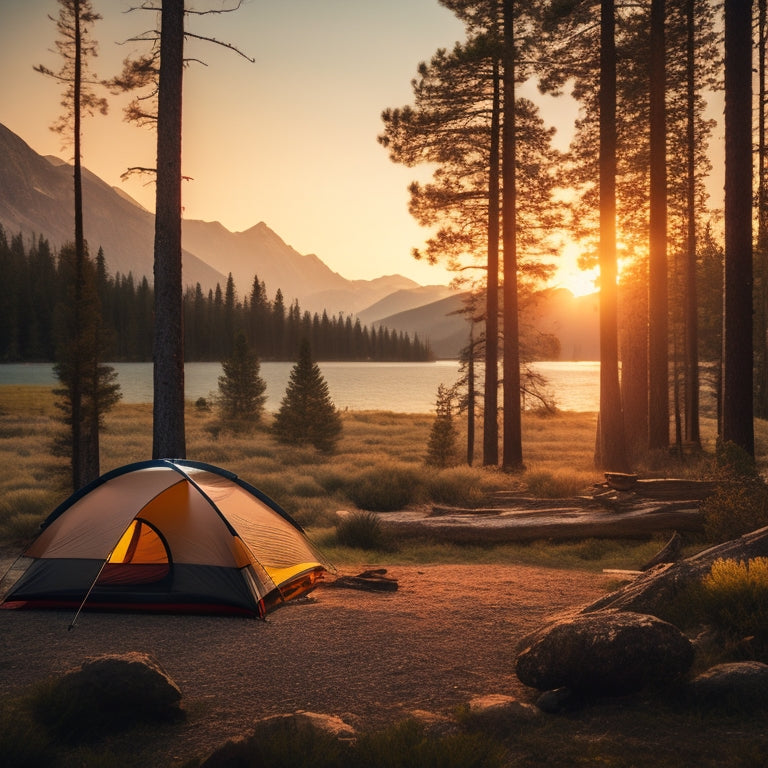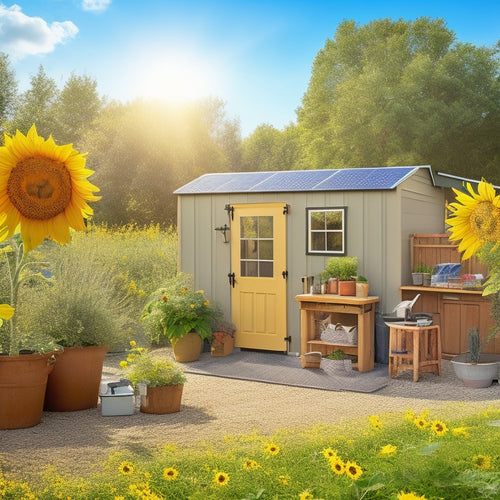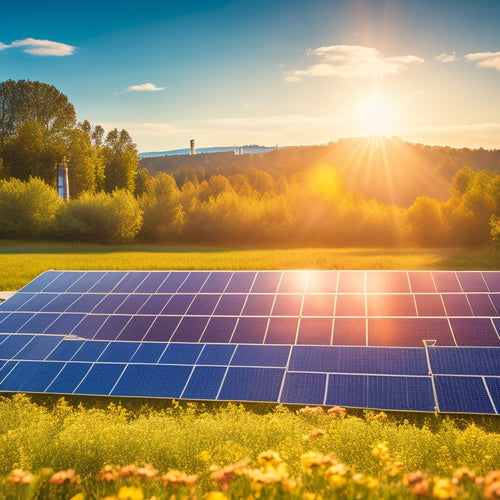
Best Camping Solar Panels for Off-Grid Adventures
Share
For your off-grid camping excursions, look for solar panels that deliver dependable power and are easy to transport. Monocrystalline panels offer high efficiency and a compact design, ideal for limited space. Don't forget to assess your energy needs—calculating the wattage required for your devices will guide your selection. Also, choose weather-resistant panels that withstand harsh conditions. With the right setup, like pairing solar panels with high-capacity lithium-ion batteries, you can enjoy uninterrupted power. Ready to uncover the best options for your outdoor journeys? There's so much more to investigate in maximizing your solar energy experience.
At a Glance
- Choose monocrystalline panels for higher efficiency and compact design or polycrystalline for cost-effectiveness and better performance in heat.
- Assess your total power needs to select solar panels that can adequately support all devices during your camping trip.
- Opt for lightweight and portable solar panels under 10 pounds to ensure easy transport and setup while camping.
- Look for durable, weather-resistant solar panels with UV protection to withstand harsh outdoor conditions.
- Consider solar generators for bridging panels and storage, providing reliable power during cloudy days or extended trips.
Efficient Energy for Remote Trips
When you're planning a remote camping trip, choosing the right solar panel type can make all the difference in your energy efficiency.
You'll want to take into account options like monocrystalline or polycrystalline panels, as they each offer unique benefits for your specific needs.
High-efficiency panels can maximize energy capture from the sun, guaranteeing you have a reliable power source.
Coupled with effective energy storage solutions, you'll make certain you have reliable power to keep your devices charged and your campsite comfortable.
Solar Panel Types
How can you choose the right solar panel type for your camping excursions? When it comes to utilizing the sun's energy, understanding the differences between monocrystalline and polycrystalline panels is essential.
Monocrystalline panels boast several advantages, including higher efficiency and a sleek design. Their uniform black color absorbs sunlight better, making them ideal for small spaces or when you need to maximize energy output.
On the other hand, polycrystalline panels come with their own unique benefits. While they generally have a lower efficiency rate than their monocrystalline counterparts, they're often more affordable and can perform better in high temperatures.
If you're planning an off-grid journey where budget plays a significant role, polycrystalline panels might be your best bet.
Consider your energy needs, space, and budget to select the right type for your setup.
Whether you opt for the high efficiency of monocrystalline or the cost-effectiveness of polycrystalline, both options can enhance your camping experience, giving you the freedom to roam without sacrificing your energy requirements.
Ultimately, it's about finding the perfect balance for your adventurous spirit!
Energy Storage Solutions
Choosing the right energy storage solution is essential for ensuring you have reliable power during your remote camping trips. You want to enjoy the great outdoors without worrying about running out of juice for your devices. A high-capacity lithium-ion battery is often your best bet, as these batteries not only provide significant power but also boast impressive energy efficiency.
When selecting a battery, consider a model with integrated battery management systems. This technology helps monitor the battery's health, optimizing its performance and extending its lifespan. You'll appreciate knowing that your investment is well-maintained, allowing you to focus on the journey ahead.
Portability is another key factor. Look for compact, lightweight options that can easily fit into your gear. Solar generators can be an excellent choice, bridging the gap between your solar panels and energy storage, ensuring you utilize every sunbeam for those cloudy days.
Ultimately, the right energy storage solution enables you to welcome freedom in your off-grid experiences. With reliable power at your fingertips, you can capture memories, stay connected, and enjoy all the comforts of home, no matter where the trail takes you.
Eco-Friendly Power Source
When you choose camping solar panels, you're opting for a sustainable energy solution that utilizes the sun's power.
These portable solar systems not only provide you with reliable electricity but also support energy independence through renewable innovations, helping reduce your carbon footprint and making your outdoor excursions more eco-friendly.
Sustainable Energy Solution
Camping solar panels offer an innovative and eco-friendly power source that aligns perfectly with your sustainable energy goals. By utilizing solar energy, you tap into a clean, renewable resource that's abundant and free.
Imagine setting up camp in a remote location, all while powering your devices with energy from the sun. This not only enhances your outdoor experience but also guarantees you're contributing positively to the environment.
The solar energy benefits are significant. Unlike fossil fuels, solar panels generate electricity without harmful emissions, allowing you to enjoy the great outdoors guilt-free.
Plus, the renewable resource advantages mean you won't deplete your energy supply—every sunny day is an opportunity to recharge. With advancements in solar technology, today's camping solar panels are lightweight, portable, and efficient, making them perfect for your off-grid excursions.
Choosing solar power means you're breaking free from dependence on traditional energy sources. You're not just camping; you're embracing a lifestyle that prioritizes sustainability.
Reduce Carbon Footprint
Utilizing solar energy while you camp not only enhances your outdoor experience but also plays an essential role in reducing your carbon footprint. By utilizing the sun's power, you're making a conscious choice that aligns with sustainable camping practices. Instead of relying on fossil fuels, you can generate clean energy right from your campsite.
Implementing carbon offsetting strategies becomes easier with solar panels, which notably lower your energy consumption and greenhouse gas emissions. Here's a quick comparison of the benefits of solar energy versus traditional power sources:
| Aspect | Solar Energy | Traditional Power Sources |
|---|---|---|
| Carbon Emissions | Minimal | High |
| Sustainability | Renewable & Abundant | Finite & Polluting |
| Long-term Savings | Notable Over Time | Ongoing Costs |
Key Specifications Overview
When choosing camping solar panels, you'll want to focus on power output ratings, portability, and weight.
These specifications will determine how effectively you can capture solar energy while ensuring your gear remains lightweight and easy to transport.
Portable solar systems enable off-grid camping, allowing you to enjoy the outdoors without sacrificing power availability.
Understanding these key factors will help you select the right setup for your outdoor excursions.
Power Output Ratings
Understanding the power output ratings of solar panels is vital for maximizing your camping experience. These ratings indicate how much energy a panel can generate under ideal conditions, which ultimately affects your ability to power devices while off-grid.
When choosing a solar panel, look for information on wattage; higher wattage usually translates to greater power efficiency. You'll want to compare the output of different models to find one that meets your needs.
For instance, if you're planning to charge multiple devices like phones, laptops, and coolers, a panel with a higher output rating is important. On the other hand, if all you need is to recharge small gadgets, a lower-rated panel might suffice.
Output comparison between panels can reveal significant differences in performance. Some panels are designed for maximum efficiency in limited sunlight, making them ideal for shaded campsites.
Others excel in direct sunlight, providing ample power for all your off-grid excursions. By understanding these power output ratings, you can guarantee that you choose a solar panel that aligns perfectly with your camping lifestyle, giving you the freedom to venture without worrying about power limitations.
Portability and Weight
As you investigate solar panel options, portability and mass become vital factors in your decision-making process. When you're out in the wild, the last thing you want is cumbersome equipment burdening you.
Look for solar panels with a compact design that easily fits into your backpack or camping gear. These panels should be foldable or rollable, allowing you to maximize space without sacrificing power.
Lightweight materials are essential, too. Many modern solar panels use advanced materials like monocrystalline silicon, which not only offer high efficiency but also reduce overall mass. This means you can carry more energy-generating capacity without the bulk.
When choosing a solar panel, consider its weight-to-watt ratio. You want a panel that delivers ample power without feeling like a chore to transport. Aim for options that weigh under 10 pounds, as they typically strike the right balance between portability and performance.
Ultimately, the right choice will enhance your off-grid journeys, giving you the freedom to roam without the encumbrance of heavy gear.
Prioritize portability and mass, and you'll enjoy a seamless outdoor experience.
Selecting Based on Wattage Output
When choosing camping solar panels, it's essential to understand your power needs.
Consider how much energy your devices require and match that with the panel's wattage output. This guarantees you'll have enough energy to keep everything running smoothly during your outdoor excursions.
Remember to evaluate the energy storage needs for any excess energy generated, as this will enhance your overall power management while camping.
Understanding Your Power Needs
Selecting the right wattage output for your camping solar panels is essential for ensuring you have enough power to meet your needs.
To start, assess your power consumption by listing all the devices you plan to use. This could include lights, phones, coolers, or even laptops. Each gadget has a specific wattage requirement, so knowing this upfront will help you gauge how much solar power you need.
Next, calculate your total energy needs by summing the wattage of each device and estimating how many hours you'll use them daily. For instance, if you plan to run a 60-watt light for 5 hours, that's 300 watt-hours (Wh) needed.
Consider energy efficiency too; choosing devices with lower power consumption can greatly reduce your overall wattage requirements. By selecting energy-efficient options, you'll maximize the utility of your solar setup.
Ultimately, your goal is to choose a solar panel system that not only meets your power needs but also enhances your freedom to enjoy the great outdoors without compromise.
Matching Panel Capacity
To effectively match the capacity of your camping solar panels with your power needs, it's crucial to understand the relationship between wattage output and your energy consumption.
Start by calculating how much energy you'll use during your off-grid journey. This includes everything from lights to charging devices. Once you have a clear idea, you can evaluate the wattage output of potential solar panels.
Remember, panel compatibility is key. Not all solar panels are created equal; some produce more energy than others, and you'll want to verify your chosen panels can meet your demands.
For instance, if you need to power a small fridge and lights, a panel with a higher wattage output will be vital.
Another aspect to take into account is energy conversion efficiency. Higher efficiency means more energy captured from the sun, which is critical when you're in remote areas where sunlight might be limited.
Higher Durability in Harsh Conditions
When you're out camping, your solar panels need to withstand the elements, from heavy rain to intense sunlight.
That's why many models are made from weather-resistant materials that offer superior protection against harsh conditions.
Investing in durable solar panels guarantees you'll have reliable energy no matter where your journeys take you.
Weather-Resistant Materials
While many outdoor enthusiasts relish the idea of off-grid escapades, they often overlook the importance of choosing solar panels made from weather-resistant materials. These panels are your lifeline when you're miles away from civilization, powering your expeditions while facing the elements.
Opting for solar panels with sturdy UV protection is crucial, as prolonged exposure to sunlight can degrade less durable materials. You want panels that will continue to perform efficiently, even under unyielding rays.
Corrosion resistance is another critical factor to take into account. If you're camping near saltwater or in humid conditions, typical solar panels can quickly deteriorate, leaving you without power.
Selecting panels built with corrosion-resistant materials guarantees they'll withstand the harshest environments, giving you peace of mind as you navigate.
Ultimately, investing in weather-resistant solar panels means you'll have a reliable energy source throughout your trek. These panels not only offer the freedom to roam but also stand strong against nature's unpredictability.
Frequently Asked Questions
How Do I Maintain My Solar Panels While Camping?
To maintain your solar panels while camping, use effective cleaning techniques like soft brushes or microfiber cloths. After use, store them properly to avoid damage, ensuring they're ready for your next journey under the sun.
Can I Use Solar Panels During Cloudy Weather?
Even on a cloudy day, like when you're camping in the Pacific Northwest, solar panel efficiency drops but doesn't stop. They can still generate power; just expect lower output and plan accordingly for cloudy weather performance.
What Types of Batteries Work Best With Solar Panels?
When choosing batteries for your solar panels, consider lithium batteries for their efficiency and longer lifespan. Lead acid batteries are more affordable but heavier and require maintenance. Your choice depends on your power needs and freedom preferences.
Are There Weight Considerations for Backpacking With Solar Panels?
When backpacking, weight considerations are essential. You'll want to choose solar panels with weight efficiency and investigate portability options. Lighter panels enhance your freedom, ensuring you carry only what you need for your journey.
How Long Do Camping Solar Panels Typically Last?
Think of camping solar panels as trusty companions. Typically, their lifespan ranges from 25 to 30 years, providing reliable camping power solutions. With proper care, you'll enjoy freedom from traditional energy sources for many excursions ahead.
Explore More
In the great outdoors, the right camping solar panel can be your trusty companion, turning sunlight into the lifeblood of your excursions. By choosing a panel that fits your wattage needs and stands up to nature's challenges, you're not just investing in energy—you're embracing freedom. So gear up, get out there, and let the sun power your expedition. After all, every great escapade deserves a bright beginning!
Related Posts
-

Building an Emergency Backup Solar Power System in 5 Essential Steps
Building an emergency backup solar power system involves five key steps. First, assess your daily energy needs to ide...
-

Advantages of Solar Generating Systems Over Traditional Energy
Solar generating systems provide several key advantages over traditional energy sources. You'll experience lower long...
-

Replacing Old Appliances With Sustainable Alternatives
Replacing old appliances with sustainable alternatives can change your home into an energy-efficient space. Not only ...


